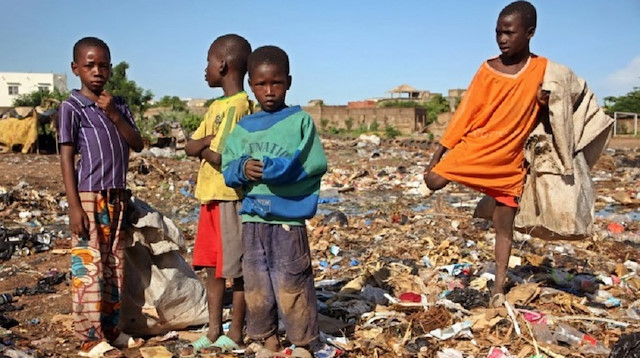
Despite being officially illegal, thousands of starving and suffering children take to the streets every day across Nigeria to beg for money or food.
The early morning chants of bowl-bearing children are a regular sight in northwest Kano, the heart of the country’s northern region.
These children survive on the little they receive from their daily benefactors, with many from the country’s southwest, haunted by poverty or the failed marriages of their parents.
Last week, President Muhammadu Buhari told UN General Assembly chief Maria Garces that over one million Nigerian children did not know the whereabouts of their parents.
However, many -- often unaccompanied -- hail from the country's northeast region where an insurgency by the Daesh-affiliated Boko Haram terror group has raged for over a decade.
Eleven-year-old Bakura Abu is one of them.
"I am from Borno. I fled with many others when Boko Haram attacked our village some years back," Abu told Anadolu Agency outside a mosque in Ikeja, the heart of Lagos, where he was asking worshippers for money.
Dozens of children his age struggle for alms outside mosques from charitable worshippers.
"I feed myself from whatever I get. I have lost both of my parents and I have been on the streets for the past three years," Abu said.
Abu said he hoped to be a truck driver and would quit begging if anyone adopted and fed him.
Alongside him was nine-year-old Yakubu Al-Hassan from Sokoto in northwest Nigeria.
Unlike Abu, Al-Hassan lives with his blind mother in the Agege slum of Lagos.
"I do this to fend for my mother. She cannot see and she's too weak," Al-Hassan told Anadolu Agency, fighting off tears.
He has never seen his father before.
"I have been doing this since I was five years old. If there were somebody to take care of my mother, I don't want to beg again. I want to be a rich trader," he said.
Thousands of children with parents who also beg often do the same as soon as they can walk and talk.
Such is the story of Farida, an eight-year-old child beggar in Fate area of Ilorin in central Nigeria.
"I followed my parents to beg as early as I could understand my environment," she said.
But Farida desires a more decent living.
"I like Muallimaah (teachers) and I want to be one," she said. "I don't enjoy begging. I also want to go to school and change the world."
The population of child-beggars has surged in the past few years and is not restricted to any particular region, as some have claimed.
Fourteen-year-old Ayo Bakare, like hundreds of his cohorts elsewhere, has become a regular face in the Abule Egba suburb of Lagos, popping up in traffic gridlocks to beg for money to eat.
Little Bakare left home when he was nine and has since survived on the begging bowl.
The surge in child destitution and begging is raising fears of higher crime rates with dire economic consequences for Nigeria.
"This is a time bomb waiting to explode unless something is done to take care of these children," David Edgal, a children’s rights advocate, told Anadolu Agency.
"We can't pretend that all is well. The rate at which children beg on the streets shows we are faced with imminent danger," he said.
He called on the government to urgently step up efforts to keep children off the streets.
"It will be too late in the next five years if we don't act urgently," Edgal warned, asserting that the current crime rate in the country had resulted from previous failures.
He said: "We presently have over 13 million out-of-school children. What do you think would happen to those children if we don't act now?"
Abubakar Umaru, a Muslim cleric, said such children could easily join extremist or criminal gangs if offered hot meals.
"I appeal to the government to please take these children from the street. They are easily manipulated," he warned.
Umaru said the Boko Haram insurgency had worsened since child begging began to increase and urged the government to do more to end the militancy.
"In the interim, one expects that the newly created commission on the reconstruction of the northeast will pay good attention to this emerging threat," he told Anadolu Agency.
Some have also called on parents to take responsibility for their children.
"Where I come from in the north, some people see marrying three to four wives as an Islamic tradition. But they forget that Islam frowns at having children that we don't cater for," Tahiru Nafada, a trader from Bauchi in the northeast, told Anadolu Agency.
He called for sanctions against parents who don't send their children to school or take care of them.














